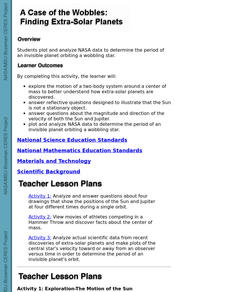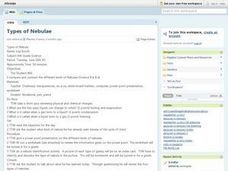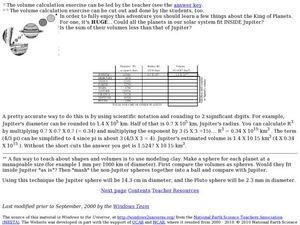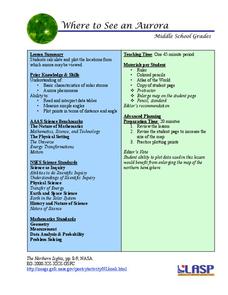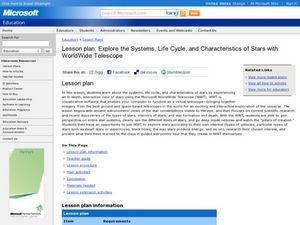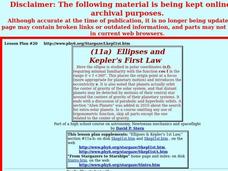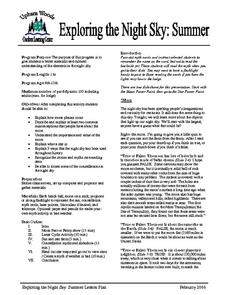Curated OER
Finding Extra-Solar Planets
Students plot and analyze NASA data to determine the period of an invisible planet orbiting a wobbling star. They explore the motion of a two-body system around a center of mass to better explain how extra-solar planets are discovered.
Curated OER
How Can We Live Here? Life In Extreme Environments
Students explore the limits of life on Earth to extend their beliefs about life to include its possibility on other worlds. They investigate three hypothetical environments and the bacterial life forms that could exist on Earth.
Curated OER
Planet Fact Sheet
In this space science worksheet, students record facts about one of the planets, which they draw in a box on the page. They write the name, distance from the sun, length of day and year, and number of moons. They describe how the planet...
Ventura County Air Pollution Control District
Effects of Global Warming
Your learners have probably heard of climate change, but do they really understand what it is? Study the history, details, and future implications of global warming and the greenhouse effect with a set of activities designed for an...
Curated OER
Metrics And Measurements
Middle schoolers engage in a study of measuring distances between geographical locations on a map. They are able to define and use the map scale in conjunction with the metric system. For this lesson plan they make their own maps and...
Curated OER
Learn Your Alphabet
In this alphabet worksheet, students cut out and assemble a 27 page mini book that has one page for each letter of the alphabet with a picture of a word that starts with that letter. There is nothing to color or write. Students read...
Curated OER
Star Words
Learners identify and categorize apostrophes. They create maps of the solar system and write simple sentences using apostrophes that describe each planet's characteristics.
Curated OER
The Moon
Students explore the relationship between the earth, sun, and moon in our solar system. They create a moonrise/moonset chart, perform a dance that models the moon phases, and create a Styrofoam model of the moon's surface.
Curated OER
Types Of Nebulae
Eighth graders explore the different types of nebulae that can be found in the solar system. They view a PowerPoint presentation about the material and identify each nebulae as it is presented. Students also discuss the life cycle of a...
Curated OER
Volume Calculation Exercise
Middle schoolers work with scientific notation and rounding as they determine volume. In this volume instructional activity, pupils attempt to calculate the volume of the planet Jupiter. They use rounding to two significant digits and...
Curated OER
Land Use
Young scholars examine ecosystems that covered Illinois 200 years ago, investigate some living and non-living components of ecosystems, identify components of prairie system, create food webs, and observe human effects on environment....
Curated OER
Using the Internet
For this using the internet worksheet, students search several websites to review information about the heart, human senses, the solar system, and planets. Students also read information about the rock cycle and answer provided questions.
Curated OER
Space, The Funky Frontier Internet Research Worksheet
In this solar system worksheet, students explore a web site called The Nine Planets, to refresh their knowledge of the solar system, and to research new facts about Uranus. They answer three questions about Uranus, write an essay about...
Curated OER
Scientific Method
In this scientific method worksheet, students read and discuss a 2 page article on the scientific method, match 3 founders of the scientific method with what they found or produced, answer 4 statements as true or false, list 3 crucial...
PHET
Where to See an Aurora
Where can you see an aurora in North America? After completing an astronomy activity, scholars can locate the exact coordinates. Pupils plot points of the inner and outer ring of the auroral oval and answer questions based on...
Chapman University
The Standard Model Poster
Chemistry classes will appreciate this color-coded, single-page reference sheet for The Standard Model of particle physics. It is divided into two main sections: elementary particles and compound particles, both with their antiparticles....
National Nanotechnology Infrastructure Network
Small Scale Stenciling: Mask Lab
Investigate the procedure for developing computer chips! Learners use solar print paper to create both positive and negative images. They observe the effects of single and multiple exposures and compare results.
Curated OER
Foreign Economics
Why do so many countries export cars? Economists examine this and other foreign economics principles through this introductory worksheet. A brief text explains international trade, then lists the top 11 leaders in global trade, along...
Curated OER
Explore the Characteristics of Stars with Microsoft WorldWide Telescope
Students explore the characteristics of stars. In this space science activity, students use the Microsoft WorldWide Telescope program to identify the properties of stars and identify the stars in the galaxy.
Curated OER
Lunar Lollipops
Students simulate the phases of the moon using a lamp and styrofoam balls. In this lunar phases lesson, students stand around a lamp and act as Earth. They hold styrofoam balls and rotate to show the phases of the moon.
Curated OER
The Outer Planets
In this outer planets worksheet, students determine if 15 statements about Neptune, Pluto, Saturn and Uranus are true or false. If they are false, students change the italicized words in the sentences to make the statements true.
Curated OER
Ellipses and Kepler's First Law
The class examines graphs in the form r = F(¿¿) in polar coordinates (r, ¿¿), in particular with the circle, ellipse and other conic sections. They determine the nature of an ellipse by studying the role of the semimajor axis and...
Curated OER
Stellar Discoveries That Are Out of This World
Students hear of the recent discovery of a group of planets orbiting the star Upsilon Andromedae. Each student create a page about an element of the universe,
Curated OER
Exploring the Night Sky: Summer
Students explain how moon phases occur. They describe and explain at least two common misconceptions that people have about the moon. Students explain what a star is. They explain 3 ways that the night sky has been used throughout history.


